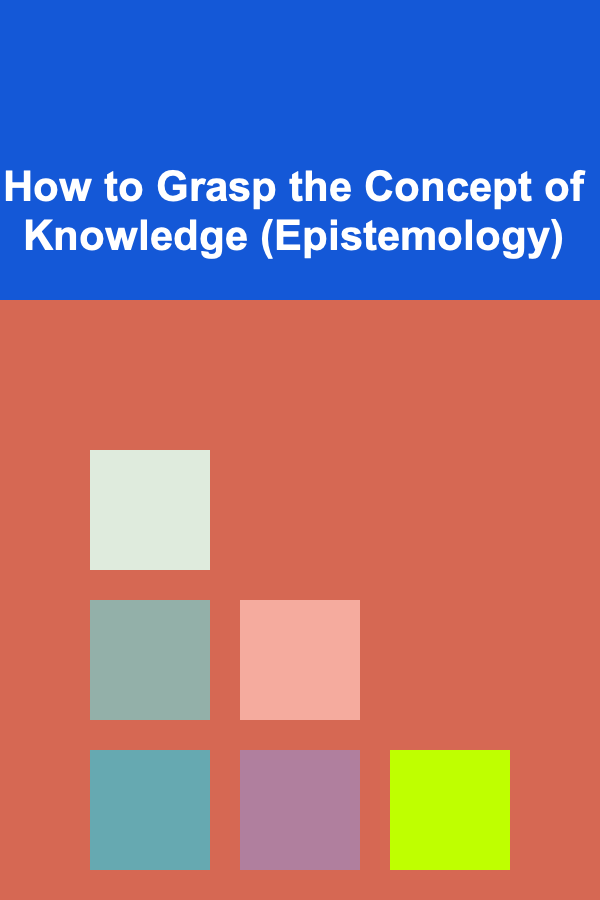
How to Grasp the Concept of Knowledge (Epistemology)
ebook include PDF & Audio bundle (Micro Guide)
$12.99$10.99
Limited Time Offer! Order within the next:

Understanding the nature of knowledge, its scope, and its limits has been a central question in philosophy for centuries. Epistemology, the branch of philosophy concerned with the theory of knowledge, explores questions like "What is knowledge?", "How do we know what we know?", and "What are the limits of human understanding?" While epistemology can often seem abstract or difficult to grasp, it is essential for both our daily lives and academic pursuits. In this article, we will break down the concept of knowledge from an epistemological perspective and provide a deeper understanding of how we can grasp it.
What is Epistemology?
Epistemology is the study of knowledge. It deals with the nature, scope, and limitations of what we know and how we come to know it. The term "epistemology" comes from the Greek words epistēmē (meaning knowledge) and logos (meaning study or discourse). At its core, epistemology seeks to answer foundational questions such as:
- What is knowledge?
- What does it mean to know something?
- How is knowledge different from belief or opinion?
- How do we justify what we know?
- Can we have certainty about anything?
These questions form the heart of the philosophical inquiry into knowledge. Epistemologists are concerned not just with what we know but with how we know it and what grounds our beliefs to be considered knowledge.
Defining Knowledge
Before diving deeper into epistemological theories, we must first understand how knowledge is defined. Traditionally, knowledge has been defined as justified true belief (JTB). This definition consists of three components:
- Belief: To know something, a person must believe it. If you don't believe something, then you cannot know it, by definition. For example, you cannot know that the sky is blue if you don't believe that the sky is blue.
- Truth: The belief must also be true. If a person believes something that is false, then they don't know it, even if they believe it strongly. For instance, if someone believes that the Earth is flat, this belief is false, and they do not know this fact.
- Justification: Belief must be justified. In other words, you must have good reasons or evidence for holding the belief that something is true. It's not enough to believe something by chance or accident; there must be a logical or empirical foundation supporting the belief.
This classical definition has been subject to criticism over time, particularly due to challenges posed by philosophers such as Edmund Gettier. In his famous 1963 paper, Gettier presented counterexamples to the JTB definition, showing that there are cases where a belief is justified and true, yet still does not count as knowledge. This led to the development of more nuanced approaches to defining knowledge.
Theories of Knowledge
Epistemologists have developed several theories over the centuries to understand how knowledge is acquired, justified, and evaluated. Some of the key theories include:
1. Empiricism
Empiricism is the theory that knowledge comes primarily from sensory experience. According to empiricists, we gain knowledge through observation, perception, and experimentation. This school of thought traces its roots to ancient Greek philosophers like Aristotle but became particularly influential with figures such as John Locke, George Berkeley, and David Hume.
For empiricists, all concepts and ideas arise from sensory experience. We learn about the world by interacting with it, and through these interactions, we form beliefs and knowledge. Empirical knowledge is often tested and verified through experimentation, observation, and sensory input.
Key Concepts in Empiricism:
- Tabula Rasa: The idea that the human mind is a blank slate at birth, and all knowledge comes from experience.
- Induction: The process of reasoning from specific observations to general conclusions.
- Verification: The principle that knowledge claims must be verifiable through experience.
Empiricism has had a profound influence on scientific inquiry, where observation and evidence play a central role in forming conclusions.
2. Rationalism
Rationalism is the theory that knowledge is primarily derived from reason and intellectual insight rather than sensory experience. Rationalists argue that there are certain truths about the world that can be known independently of experience. This includes basic logical principles, mathematics, and fundamental truths about existence.
René Descartes, Baruch Spinoza, and Gottfried Wilhelm Leibniz were major proponents of rationalism. They believed that reason is the primary source of knowledge, and through logical deduction and intellectual reflection, we can arrive at certain knowledge that is true and universally valid.
Key Concepts in Rationalism:
- Innate Ideas: The belief that some knowledge is inherent in the mind and does not need to be learned from experience.
- Deductive Reasoning: The process of drawing conclusions from general principles or premises through logical reasoning.
- A Priori Knowledge: Knowledge that is independent of experience, such as mathematical truths or logical principles.
Rationalism stands in contrast to empiricism by asserting that there are fundamental truths that can be known without sensory input.
3. Constructivism
Constructivism is a theory of knowledge that emphasizes the role of the individual in constructing knowledge. According to constructivists, knowledge is not passively received but actively built by individuals based on their experiences and interactions with the world. The theory asserts that learners construct their own understanding and knowledge through experiences, social interactions, and reflections.
Jean Piaget, Lev Vygotsky, and Jerome Bruner are key figures in the development of constructivist theories. Constructivism posits that knowledge is not an objective reality that exists outside of the individual; rather, it is shaped by personal perceptions, contexts, and interpretations.
Key Concepts in Constructivism:
- Schema: Mental frameworks that help individuals organize and interpret information.
- Assimilation and Accommodation: The processes by which new experiences are incorporated into existing schemas or lead to the modification of those schemas.
- Zone of Proximal Development (ZPD): Vygotsky's concept that describes the difference between what a learner can do independently and what they can do with guidance.
Constructivism has significant implications for education and learning, suggesting that individuals learn best when they actively construct knowledge rather than passively receiving information.
4. Pragmatism
Pragmatism is a theory of knowledge that emphasizes the practical consequences and usefulness of beliefs in determining their truth. According to pragmatists, knowledge is not about abstract truths but about what works in practice. This theory focuses on the application of ideas and beliefs to solve problems and achieve goals.
Figures such as Charles Sanders Peirce, William James, and John Dewey are central to the development of pragmatism. For pragmatists, the meaning of an idea or concept is tied to its practical effects and its ability to address real-world issues.
Key Concepts in Pragmatism:
- Practical Consequences: Knowledge is validated through its practical use and effectiveness in solving problems.
- Fallibilism: The belief that knowledge is always subject to revision based on new evidence and experiences.
- Inquiry: A process of seeking practical solutions to problems and testing ideas through action.
Pragmatism provides a flexible approach to knowledge, where truth is not fixed but evolves with experience and practical application.
Justification of Knowledge
One of the central questions in epistemology is how we justify our knowledge. Justification refers to the reasons or evidence that support a belief, making it more than just an opinion. There are several approaches to understanding justification, including:
1. Foundationalism
Foundationalism is the view that knowledge must be built upon a foundation of certain, indubitable beliefs. These foundational beliefs serve as the starting points for constructing further knowledge. According to foundationalists, there are certain self-evident truths that do not require further justification and form the base for all other knowledge.
2. Coherentism
Coherentism, in contrast, argues that beliefs are justified by their coherence with other beliefs. Rather than resting on foundational truths, knowledge is justified by the way in which beliefs fit together in a consistent and logical system. In this view, a belief is justified if it coheres with other beliefs within the system, even if there are no indubitable foundational beliefs.
3. Reliabilism
Reliabilism focuses on the reliability of the process that leads to a belief. According to this theory, a belief is justified if it is produced by a reliable cognitive process that generally leads to true beliefs. For instance, if a person forms a belief based on a reliable perception or reasoning process, that belief can be justified, even if it isn't directly supported by empirical evidence.
The Limits of Knowledge
While epistemology seeks to explore how we come to know things, it also delves into the limits of knowledge. Are there things that are unknowable? Can we ever achieve absolute certainty about anything? Some of the key challenges in this area include:
1. Skepticism
Skepticism is the view that we cannot have certain knowledge about the world. Skeptics argue that our perceptions, reasoning, and even scientific methods can be flawed or misleading, leading to the conclusion that knowledge is always uncertain. Classical skeptics, like Pyrrho of Elis, questioned whether we could truly know anything, while modern skeptics often focus on the limits of empirical and sensory knowledge.
2. The Problem of Induction
The problem of induction, famously raised by David Hume, questions whether we can justify our inductive inferences. Induction involves reasoning from past experiences or observations to predict future events. However, there is no logical guarantee that the future will resemble the past, leading some philosophers to question the reliability of inductive reasoning as a means of acquiring knowledge.
3. Theories of Truth
Epistemologists also consider various theories of truth, such as the correspondence theory (which states that beliefs are true if they correspond to reality), the coherence theory (which asserts that beliefs are true if they fit coherently into a system of beliefs), and the pragmatic theory (which maintains that beliefs are true if they are useful and practical).
Conclusion
Grasping the concept of knowledge requires understanding its nature, acquisition, justification, and limitations. Epistemology provides us with valuable tools to explore these questions, whether we adopt an empirical, rational, or pragmatic approach to understanding the world. By engaging with the theories of knowledge and questioning our assumptions, we can develop a deeper understanding of how we come to know things and the extent to which we can trust our knowledge.
In the end, the study of epistemology challenges us to consider the complexity of knowledge and invites us to reflect on our beliefs, how we form them, and how we justify them. It remains a powerful tool for navigating the ever-changing landscape of human understanding.

How to Clean and Care for Your Carpet to Extend Its Life
Read More
How to Navigate Remote Mountain Passes
Read More
How To Discover Series That Are Undeniably Cult Classics
Read More
How to Decorate Wedding Cakes (Beginner's Guide)
Read More
How to Effectively Communicate Supply Chain Insights to Stakeholders
Read More10 Tips for Insurance Agents: Accurate Commission Income Tracking
Read MoreOther Products

How to Clean and Care for Your Carpet to Extend Its Life
Read More
How to Navigate Remote Mountain Passes
Read More
How To Discover Series That Are Undeniably Cult Classics
Read More
How to Decorate Wedding Cakes (Beginner's Guide)
Read More